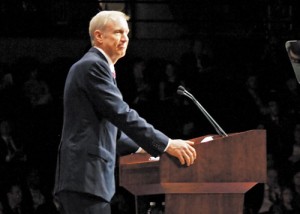Unions contend governor attacking middle class
Kevin Beese — February 16, 2015 Labor leaders are cheering the decision of the state comptroller and attorney general not to implement the governor’s proposed elimination of a long-standing union payment practice.
Labor leaders are cheering the decision of the state comptroller and attorney general not to implement the governor’s proposed elimination of a long-standing union payment practice.
Comptroller Leslie Munger and Attorney General Lisa Madigan both said that Gov. Bruce Rauner’s executive order to ban fair-share status for union employees will not be put into action. Fair-share status requires that individuals who receive payments and other contractual benefits negotiated by a union must pay union dues, whether they join the union or not.
“The governor’s action was a blatantly illegal abuse of his power, so we’re glad to see a bipartisan confirmation that the constitution still matters,” said Dan Montgomery, president of the Illinois Federation of Teachers, which is based in Westmont. “A democracy does not allow one man to implement his ideological will as he chooses, and so Comptroller Munger and Attorney General Madigan rightfully put the law over politics.
“As he considers his upcoming budget plan, the governor would be wise to do the same. Our state has serious financial challenges, and Gov. Rauner’s out-of-touch partisan attacks on middle-class families and the unions who give them a collective voice isn’t the way to solve them. Let’s hope we can start working together in earnest.”
Union leadership’s response was loud and strong after Rauner issued the executive order last week.
“This is a blatant attack on unions, and furthermore, an assault on working families in Illinois,” Becky Strzechowski, president of Teamsters Local 700, based in Park Ridge, said of Rauner’s edict for public sector employees.
Labor leaders contend that the strength of unions is limited when individuals get the benefits provided by a union without paying for them.
Rauner contends that state workers should not have to pay for union representation if they do not want it.
“Employees of the state of Illinois must not be forced against their will to participate in or fund public sector labor union activities to which they object,” Rauner said in signing the executive order last week.
He said public sector employees cannot be forced to subsidize the political speech of public sector labor unions.
The governor said the long-held practice of “fair share” goes against the First Amendment of the U.S. Constitution, which ensures freedom of association.
“By requiring non-union members to pay ‘fair-share’ fees to unions by imposing automatic paycheck deductions without any regard to whether an employee objects to the views and actions of public labor unions’ representatives, the collective bargaining agreements force some employees to subsidize and enable union activities that they do not support,” Rauner decreed.
Rauner contends that “fair-share” fees are funding inherently political activities to influence core public sector issues, such as wages, pensions and benefits that are all mandatory subjects of collective bargaining under the Illinois Labor Act.
“At least in part because of the cost of wage, pension and benefits packages obtained by state employee unions in previous administrations with the use of compelled ‘fair-share’ fees, the state of Illinois currently has a staggering structural budget deficit and unfunded pension liability of $111 billion, the largest such deficit as a percentage of state revenue in the country,” Rauner said.
Tom Balanoff, president of the Service Employees International Union, called Rauner’s move a “blatant abuse of power” and said that the governor “knows this is not legal.”
Montgomery said the state’s financial woes are not going to be solved by attacking working families.
“Rather than offer concrete solutions on how he will better fund our public schools and services, the governor continues to engage in unproductive, partisan politics,” Montgomery said.
The American Federation of State, County and Municipal Employees, which represents thousands of state workers, in a statement condemned the governor’s action.
“Perhaps as a private equity, CEO Rauner was accustomed to ignoring legal and ethical standards, but Illinois is still a democracy and its laws have meaning,” AFSCME leadership said. “It is crystal clear by this action that the governor’s supposed concern for balancing the state budget is a paper-thin excuse that can’t hide his real agenda: silencing working people and their unions who stand up for the middle class.”







